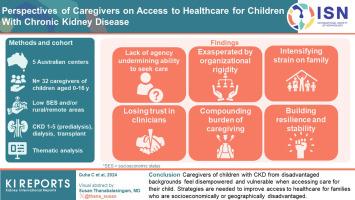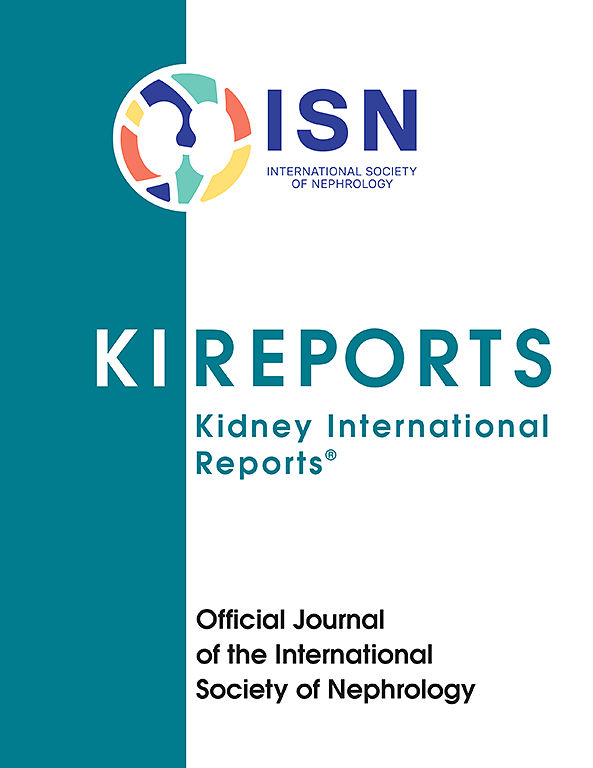Perspectives of Caregivers on Access to Health Care for Children with CKD
IF 5.7
2区 医学
Q1 UROLOGY & NEPHROLOGY
引用次数: 0
Abstract
Introduction
Inequitable access to health care based on demographic factors such as ethnicity, socioeconomic status and geographical location has been consistently found in children with chronic kidney disease (CKD). However, little is known about the perspectives of caregivers on accessing health care. We described caregivers’ perspectives on accessing health care for children with CKD from socioeconomically disadvantaged backgrounds and/or rural or remote areas.
Methods
Caregivers of Australian children aged 0 to 16 years, across all CKD stages, from low socioeconomic status backgrounds, and/or residing in rural or remote areas, purposively sampled from 5 centers, participated in semi structured interviews on accessing health care. Transcripts were analyzed thematically.
Results
From 32 interviews, we identified 6 themes: lack of agency undermining ability to seek care (obscurity of symptoms, uncertain and confused about care processes, and vulnerable and unable to advocate), losing trust in clinicians (confused by inconsistencies and ambiguities in advice, and distressed by lack of collaborative care), exasperated by organizational rigidity (frustrated by bureaucratic roadblocks, lack of access to specialist care in rural and remote settings, and inadequacies of support programs), compounding burden of caregiving (unsustainable financial pressure, debilitating exhaustion, and asymmetry of responsibility), intensifying strain on family (uprooting to relocate, sibling stress and neglect, and depending on family support), building resilience and stability (empowerment through education and confidence in technical and medical support).
Conclusions
Caregivers of children with CKD from disadvantaged backgrounds feel disempowered and vulnerable when accessing care for their child. Strategies are needed to improve access to health care for families who are socioeconomically or geographically disadvantaged.

照护者对患有慢性肾脏病的儿童获得医疗服务的看法
在慢性肾脏病(CKD)患儿中,根据种族、社会经济地位和地理位置等人口统计因素,获得医疗保健服务的机会一直不平等。然而,人们对照护者获取医疗保健服务的观点却知之甚少。我们描述了来自社会经济弱势背景和/或农村或偏远地区的慢性肾脏病患儿的护理人员对获得医疗保健服务的看法。我们有目的地从 5 个中心抽取了 0 至 16 岁澳大利亚儿童的看护者,他们来自社会经济地位较低的地区和/或居住在农村或偏远地区,跨越了所有 CKD 阶段,参加了关于获取医疗保健服务的半结构式访谈。我们对访谈记录进行了专题分析。从 32 个访谈中,我们确定了 6 个主题:缺乏代理权削弱了寻求医疗服务的能力(症状不明显、对医疗过程不确定和困惑、易受伤害且无法倡导)、失去对临床医生的信任(因建议不一致和含糊不清而困惑、因缺乏合作性医疗服务而苦恼)、因组织僵化而恼怒(因官僚主义障碍而沮丧、在农村和偏远地区无法获得专科医疗服务、护理负担加重(经济压力难以承受、疲惫不堪、责任不对称)、家庭压力增大(背井离乡、兄弟姐妹的压力和忽视、依赖家人的支持)、复原力和稳定性降低(通过教育增强能力、对技术和医疗支持充满信心)。家境贫困的慢性肾功能衰竭患儿的照顾者在为其子女获取医疗服务时感到无能为力和易受伤害。需要制定战略,改善社会经济或地理位置不利的家庭获得医疗服务的机会。
本文章由计算机程序翻译,如有差异,请以英文原文为准。
求助全文
约1分钟内获得全文
求助全文
来源期刊

Kidney International Reports
Medicine-Nephrology
CiteScore
7.70
自引率
3.30%
发文量
1578
审稿时长
8 weeks
期刊介绍:
Kidney International Reports, an official journal of the International Society of Nephrology, is a peer-reviewed, open access journal devoted to the publication of leading research and developments related to kidney disease. With the primary aim of contributing to improved care of patients with kidney disease, the journal will publish original clinical and select translational articles and educational content related to the pathogenesis, evaluation and management of acute and chronic kidney disease, end stage renal disease (including transplantation), acid-base, fluid and electrolyte disturbances and hypertension. Of particular interest are submissions related to clinical trials, epidemiology, systematic reviews (including meta-analyses) and outcomes research. The journal will also provide a platform for wider dissemination of national and regional guidelines as well as consensus meeting reports.
 求助内容:
求助内容: 应助结果提醒方式:
应助结果提醒方式:


